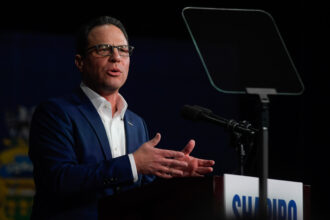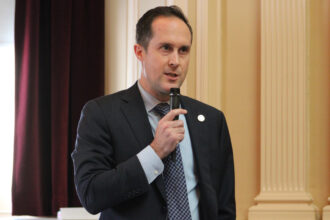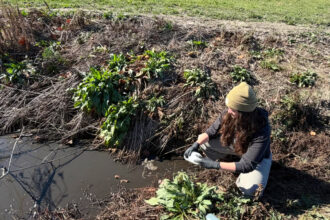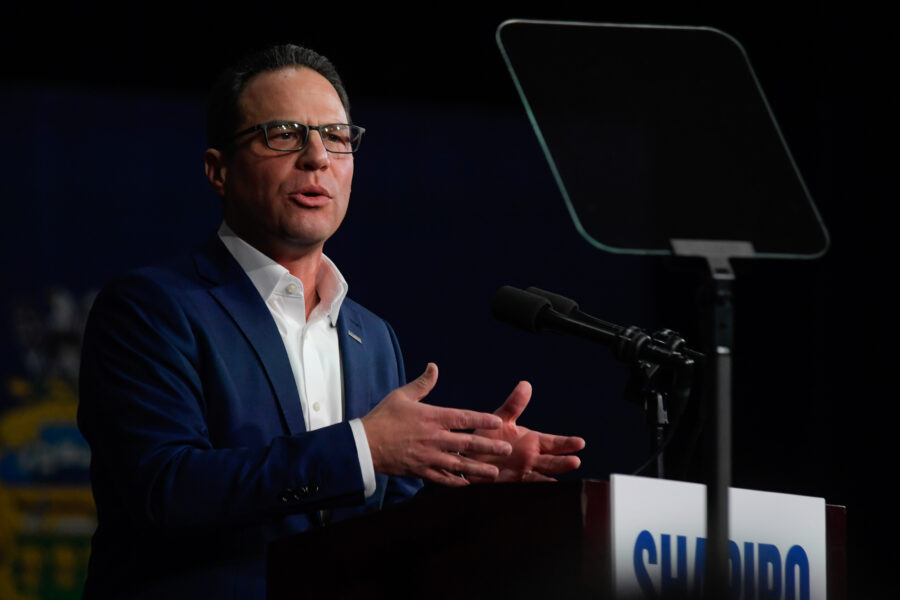Is Canada considering giving its oil and gas industries — particularly the tar sands — more leeway on greenhouse gas emissions?
A draft document obtained by CBC News and reported last night suggests the idea was to be proposed to Prime Minister Stephen Harper ahead of this week’s climate summit. That report inspired a “lie-in” today by Canadian youth at the Bella Center in Copenhagen, where international climate negotiations are under way.
“Climate impacts are already being felt — in the North, on our coasts, in our forests. Climate change is the greatest risk posed to the security and prosperity of present and future generations. By their conscious failure to act on the climate crisis, the Canadian government is knowingly committing us to climate chaos,” said Megan McKeen, 18, part of the Canadian youth delegation.
Canadian Environment Minister Jim Prentice, in Copenhagen for the talks, told the CBC today that he hadn’t seen the draft but stressed that it did not represent the official position of the Harper government.
However, Prentice also said that the government has not ruled out special breaks on emissions for tar sands companies.
The draft documents suggested lowering the oil and gas industries’ required emissions cuts from 48 megatons below business as usual to 15 megatons below business as usual instead. The outcome would be greenhouse gas reductions three times weaker than the government initially proposed in 2007, said Matthew Bramley, director of the Pembina Institute‘s Climate Change Program.
Emissions from the oil and gas sector as a whole could increase 37 percent above 2006 levels by 2020, as opposed to the initial requirement of a 6 percent cut, Bramley said. On top of that, companies could comply by paying into a technology fund instead of reducing their emissions. If those changes were made, Canada would miss the goals its leaders were bringing to Copenhagen by a huge margin, he said.
Steven Guilbeault of Équiterre told reporters in Copenhagen:
“We think it’s unacceptable that one of the richest nations on the face of this planet is not willing to do its fair share when it comes to reducing greenhouse gas emissions. We have one of the worst records of all 57 richest nations on the planet, second to last, just in front of Saudi Arabia.”
The Harper government has proposed a national emissions target of 20 percent below 2006 levels by 2020, equivalent to about 3 percent below 1990 levels.
Also on Tuesday,
• A new plan surfaced for the deforestation program REDD that for the first time puts a dollar figure on the table, but it still lacks funding commitments from developed countries to cover the cost. Experts following the talks say the United States and Colombia are part of the problem.
• African nations saw no progress on their calls for more ambitious reduction targets from the developed world, said Raman Mehta of ActionAid. “The developed countries have been dragging their feet,” Mehta said. Worse, added Dale Marshall of the Canada-based David Suzuki Foundation, developed countries are blaming the developing countries for the hold-up.
• Everyone is counting on the heads of state, who begin arriving on Wednesday, to change the game, said Kathrin Gutman of WWF.
The Climate Action Network, a global group of about 500 non-governmental organizations promoting worldwide action to limit climate change, offers a video overview of the day’s events:
(Photo:
About This Story
Perhaps you noticed: This story, like all the news we publish, is free to read. That’s because Inside Climate News is a 501c3 nonprofit organization. We do not charge a subscription fee, lock our news behind a paywall, or clutter our website with ads. We make our news on climate and the environment freely available to you and anyone who wants it.
That’s not all. We also share our news for free with scores of other media organizations around the country. Many of them can’t afford to do environmental journalism of their own. We’ve built bureaus from coast to coast to report local stories, collaborate with local newsrooms and co-publish articles so that this vital work is shared as widely as possible.
Two of us launched ICN in 2007. Six years later we earned a Pulitzer Prize for National Reporting, and now we run the oldest and largest dedicated climate newsroom in the nation. We tell the story in all its complexity. We hold polluters accountable. We expose environmental injustice. We debunk misinformation. We scrutinize solutions and inspire action.
Donations from readers like you fund every aspect of what we do. If you don’t already, will you support our ongoing work, our reporting on the biggest crisis facing our planet, and help us reach even more readers in more places?
Please take a moment to make a tax-deductible donation. Every one of them makes a difference.
Thank you,












